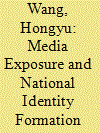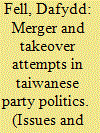|
|
|
Sort Order |
|
|
|
Items / Page
|
|
|
|
|
|
|
| Srl | Item |
| 1 |
ID:
160113


|
|
|
|
|
| Summary/Abstract |
Using survey method, this study compares the relative importance of exposure to Chinese media, pro-China local media, pro-democracy local media, and new media (e.g., Weibo, Facebook) on the building of national identity among Macau college students. We argue that the effect of media exposure on national identity formation is not uniform, owing to the political leanings of the media and the platform on which the information is transmitted (new media vs. traditional media). We find that getting news about China on Facebook is the most important predictor of the formation of national identity among college youth in Macau, followed by getting news on Weibo and exposure to traditional Chinese media. Conversely, exposure to pro-democracy local media and frequent use of Facebook exert a negative effect on national identity building among college youth in Macau. Positive sentiment toward China and trust in the central government act as mediators and fully explain the relationship between exposure to traditional pro-China media and national identity but cannot explain the positive effect of exposure to new media on national identity formation.
|
|
|
|
|
|
|
|
|
|
|
|
|
|
|
|
| 2 |
ID:
160114


|
|
|
|
|
| Summary/Abstract |
Taiwan has experienced a number of party splits and attempted mergers since democratization. These have played a critical role in the development of the country’s party system. While a number of studies have looked at the emergence of Taiwan’s splinter parties, party mergers have not received academic attention. This study aims to systematically examine the process of party mergers and takeovers. We examine four cases of attempted mergers and takeovers. In each case, we focus the analysis around three core questions: (1) How should we best classify the actual outcomes? (2) How we can best explain the variation in outcomes? (3) How can we assess the success of merger/takeover attempts? Unlike earlier studies, we examine a variety of merger outcomes rather than just successful cases. In addition to mergers, we propose the terms negotiated takeovers and hostile takeovers. Our classification scheme is based on relative party power and the inter-party relationship. To explain the variation in outcome, we applied a framework stressing the interplay of contextual, inter-party and inner-party factors. We found key contextual variables were electoral results, relative party sizes and the electoral system. The most important inter-party variables were ideological proximity and inter-party trust following successful cooperation. Lastly, the inner-party balance of power was also critical, particularly, the strength of leaders with favorable attitudes toward the merger project. We assess the success and failure of merger/takeover attempts with reference to election results, post-merger party unity and whether the post-takeover relationship was cooperative.
|
|
|
|
|
|
|
|
|
|
|
|
|
|
|
|
| 3 |
ID:
160116


|
|
|
|
|
| Summary/Abstract |
This paper demonstrates how the Chinese Communist Party (CCP) designed the political role of the People’s Court for authoritarian regime resilience. In particular, the case of the revision of the Environmental Protection Law (EPL) is selected because it was the first law in China to give detailed rules for public-interest trials. To illustrate the process by which the law was made, the paper is divided into three parts: (1) the practice of local governments before the revision of the law, (2) central government inspections in the provinces during the period that the law was being made, and (3) the revision process of the EPL in the National People’s Congress. From this analysis, the paper concludes that the CCP streamlined the litigation process because it wanted to use the People’s Court system as a tool to collect and understand citizen complaints, which it could then use to manage the issues of social stability.
|
|
|
|
|
|
|
|
|
|
|
|
|
|
|
|
| 4 |
ID:
160115


|
|
|
|
|
| Summary/Abstract |
This paper explores the factors that affect Taiwanese citizens’ resistance to closer relations with China. Elements in Taiwanese society have recently exhibited a strong sense of anxiety in the face of a rising China. Distinct from the past military confrontation between China and Taiwan, more recently, Taiwanese citizens have been subject to a strengthening of cross-Strait relations and interactions, which makes their rising resistance to China puzzling. To empirically and theoretically explain why Taiwanese are resistant to closer ties with the mainland, we discuss three potential sources: cultural alienation, democratic anxiety, and economic interest. We test the effects of these three attitudinal factors on Taiwanese resistance to Chinese tourists, students, and workers using the China Impact Survey 2012 data set. The findings suggest that democratic anxiety, economic interest, and cultural alienation are all strong predictors in accounting for the public’s resistance to Chinese tourists and students, while economic interest is the most powerful factor in Taiwanese attitudes toward policies regarding Chinese workers. The findings provide important policy implications for policy makers in dealing with cross-Strait relations.
|
|
|
|
|
|
|
|
|
|
|
|
|
|
|
|
|
|
|
|
|